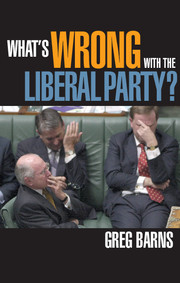Book contents
- Frontmatter
- Contents
- Dedication
- Acknowledgements
- 1 Introduction
- 2 ‘Walking Down the Middle of the Road’
- 3 A Liberal Party Obsession
- 4 Whither the Nationals?
- 5 Assuming One Nation
- 6 The Paradox
- 7 After Howard?
- 8 Meeting the Challenges: Have the Liberals Been Captured?
- 9 So Where To from Here?
- 10 Conclusion
- Endnotes
- Bibliography
- Index
8 - Meeting the Challenges: Have the Liberals Been Captured?
Published online by Cambridge University Press: 04 August 2010
- Frontmatter
- Contents
- Dedication
- Acknowledgements
- 1 Introduction
- 2 ‘Walking Down the Middle of the Road’
- 3 A Liberal Party Obsession
- 4 Whither the Nationals?
- 5 Assuming One Nation
- 6 The Paradox
- 7 After Howard?
- 8 Meeting the Challenges: Have the Liberals Been Captured?
- 9 So Where To from Here?
- 10 Conclusion
- Endnotes
- Bibliography
- Index
Summary
If you want to get up a big political story in the media, then the weekend before Christmas is probably not the ideal time to do it. Most politicians are heading off for their summer break, and even for political junkies it's time to delve into the Christmas novel and put the feet up to watch the cricket or dive into the surf. But on the weekend before Christmas 2002, the Australian published an article by one of its most experienced Canberra writers, George Megalogenis, that should have been compulsory reading over the festive season for anyone with even a passing interest in the future of public policy in Australia and in how the Howard Liberals might deal with the policy challenges of the 21st century.
Megalogenis analysed unpublished data from the 2001 national census, along with leaked polling material obtained from both the Liberals and the Labor Party. His findings confirmed that John Howard's Liberals had a political strategy of populist conservatism and an appeal to nationalism attacking ‘political correctness’ and ‘special interest groups’ along the way. The Liberal Party holds twenty of the fifty lowest-income seats in Australia. These are seats that range from Cowper in New South Wales, where 67 percent of families earn less than $ 1,000 a week, through to Forrest in Western Australia, with 52 percent of families in a similar position.
- Type
- Chapter
- Information
- What's Wrong with the Liberal Party? , pp. 104 - 117Publisher: Cambridge University PressPrint publication year: 2003



